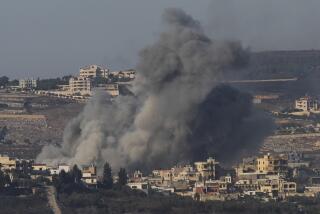Distrust Drives Serbs to Flee Village That Is Changing Hands
- Share via
ZELINA, Bosnia-Herzegovina — After fighting successfully through about 3 1/2 years of war to hold on to his ancestral home in a mountainous region near Bosnia’s front line, Svjetko felt he had no choice but to abandon it this week because of peace.
His is one of hundreds of families in this Bosnian Serb village, and six similar villages nearby, that weathered the war but are now in the midst of a reluctant exodus because their land will become part of the territory of the Muslim-Croat federation under the peace accord forged in Dayton, Ohio.
Earlier this week, the 41-year-old carpenter-turned-soldier gathered clothes, furniture and family heirlooms and visited the graves of his father and grandfather.
“According to the Orthodox custom, I lit candles on their graves,” said Svjetko, a hulking man wearing camouflage fatigues and unable to fight back tears. “It was so hard to leave. It’s the most painful thing that can happen in a man’s life.”
Svjetko said he was afraid to give his last name because he had no idea where he and his family would settle and he did not want to offend any authorities.
Many traditional Muslim areas will fall under Bosnian Serb control under the peace accord. But while the Serbs are fleeing, most of the Muslims are staying put; they have more confidence in the prospects for peace and in the NATO-led Implementation Force’s ability to protect them, according to local officials and foreign observers.
The years of fierce warfare in Bosnia-Herzegovina have left many ghost towns and as many as 3 million refugees. The Dayton agreement specifies that all the people of Bosnia should be allowed to remain in or return to their homes, whether in territory controlled by the Muslim-Croat federation or in the Bosnian Serbs’ Republika Srpska.
But many families like Svjetko’s are worried that they will not be safe if they stay in areas controlled by their wartime enemies.
“No one is telling them to go,” said U.S. Army Capt. Robert Ivy, whose men patrol the former front-line area as part of the Implementation Force, or IFOR. “But there is such deep distrust between the Serbs and Muslims that they don’t think they can live together.”
Ivy’s troops have watched as hundreds of Serbian families in the area stripped their houses of everything valuable--including kitchen sinks, windows and doors.
Some of the families appeared to have been in more of a hurry than others. While all that was left of some houses were the brick frames, at several homes in Zelina, laundry that had been left behind was covered with 2-day-old snow.
Some people--mostly the elderly or desperately poor--stayed behind because they had no choice. “I don’t have anywhere to go,” said Zora Milic, 37, whose family is one of the few remaining in Zelina. “We’ve always lived here.”
She said her neighbors left because they were afraid of what the Bosnian Muslims will do when they take over the village. “I have three kids and a husband. I think it’s safer for us here than to go and live in some Muslim’s house on Serbian territory. If someone orders us to move out, we will. But if not, we’re staying.”
Milic continued, “Of course it’s lonely here.” But she quickly added that she is used to being alone. Many of her neighbors left temporarily during the war because their houses were so close to the front line that they could hear a constant rumble from the shelling. Some houses about a quarter of a mile from her own were destroyed during the years of fighting.
Milic and the few other Zelina residents who are staying said they do not believe they have anything to fear from fellow former Yugoslavs, despite the bitter war.
Local Bosnian Muslim leaders also said the families in Zelina and other traditionally Serbian villages will not be in any danger once the Muslim-Croat federation officially takes over.
“They don’t have any reason to be afraid or to move out,” said Ibro Lozinca, 44, the mayor of Memici, the closest Muslim town to Zelina. Memici was looted and destroyed during the war, but the former residents intend to rebuild as soon as they can.
“There will be no revenge,” he said firmly. “Muslims are people who can suffer greatly and then forget and forgive. There is no need for our people to move into their houses in Zelina. We hope that they will understand this and move back to their homes.”
More to Read
Sign up for Essential California
The most important California stories and recommendations in your inbox every morning.
You may occasionally receive promotional content from the Los Angeles Times.













